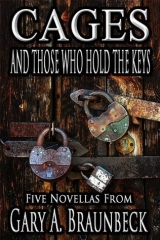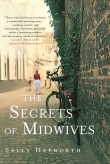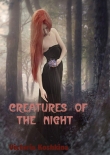
Текст книги "Cages and Those Who Hold the Keys"
Автор книги: Gary A. Braunbeck
сообщить о нарушении
Текущая страница: 28 (всего у книги 31 страниц)
8
Once you have reached this step in the process, the base-patches should reveal to you the overall pattern you need to follow in order to complete your quilt. How wide to make it and how many patches should be included is up to you. You’re on your way to having a patchwork quilt! Congratulations! Now, go back, and repeat steps 1-7 as needed.
* * *
Marian and Jack came out with Boots by their side. Alan stood by the Mom-thing’s along with everyone else. Marian walked over and embraced her brother. “Okay, Alan. I know the rest of it.” “You’ll have to stay here now, you know?” “I know.” “Can you accept that?”
“Someday, I think.” Marian then caught sight of a new figure entering the cemetery, and smiled when she saw Laura walking toward her. Her sister-in-law’s skin was cadaverous, her eyes blank. She had been torn open from the center of her chest on down. Her stomach, liver, and uterus dangled within shiny loops of grey intestine, caught there as if in a spider’s web. Everything drooped so low it nearly touched the ground.
She was carrying something that was almost too big for her to handle.
Walking up to Marian, Laura handed over her Story-Quilt-wrapped burden, then took her place by her husband’s side, draping one cold-dead arm around his waist, resting her head on his shoulder. Alan kissed her cheek and pointed to the spot where they would rest come morning.
Marian pulled back a corner of the quilt and looked into the baby’s face.
Its head was so much larger than the rest of its body, semi-round with deep horizontal grooves in the flesh as well as the skull beneath. Its eyes were so abnormally large and round, its mouth deformed, its nose misshapen and dwarfed by the rest of its features.
Marian wept joy for its hideousness and blessed the night for the pain it was in, a pain that she was now more than willing to share, to savor along with this creature, her nephew, her son, her lover-to-be.
The Quinlan bloodline would remain pure. She could almost see the faces of the children she would have with this after it grew up. How glorious they would be.
She checked her watch. It was nearly midnight. At sunrise on All Saints’ Day the dead would have to return to their graves and wait for next Hallowe’en to come around before they could rise again. She studied the pile of stones and human heads. “A family cathedral,” she said. The thing in her arms cooed and coughed in approval.
There was a stone quarry not too far away. The lumber mill was even closer. She had the whole town here; young and old, the living and the dead.
They had until dawn.
Plenty of time for a good enough start.
She faced the crowd. “We all know what has to be done. If we don’t finish tonight, we’ll meet here again next year, and the year after that, and the year after that. However long it takes.” She stroked the surface of the Story Quilt, knowing what illustration she’d use for the final patch once this project was completed. She could be patient. She was not alone.
She never would be again. She lifted her head and faced the crowd once again. “Let’s get to it.”
Everyone smiled, the Hallowe’en moon grew brighter as the church bell gave a triumphant ring, and, as a family, they began to raise a dream from the silent, ancient dust of death.
In Loving Memory of My Father,
Frank Henry Braunbeck
May 22, 1926 – June 15, 2001
“No, good sir; the privilege was mine.”
The Sisterhood
of Plain-Faced Women
"We will gather images and images of images until the last—which is blank: This one we agree on." —Edmund Jabés, "Mirror and Scarf"
1. Ones Who By Nature
As she watched people file into the pub Amanda found herself recalling some lines from an old T.S. Eliot poem: In the room the women come/and go/Talking of Michelangelo. How many women, she wondered, had come in here since she’d first sat down, come in quite alone but looking ever so lovely, only to leave with a man in tow, complimenting him on how wonderful he looked and getting the same in return? How much attention had these women relinquished on their faces, their lovely, just right, just so faces, making sure the eye shadow wasn't too heavy, the base not too thick, the rouge not too bright, all of it in an effort to—as that old cosmetics slogan used to say—Right Nature's Wrongs?
In the room the women come and go...
Lighting a cigarette, she blinked away a sad memory and shrank into herself.
There are lonely ones who by nature cannot smile; watching in silence as people pass by, they never dare to speak for fear they might say the wrong thing. It would be a mercy if the Passing People became little more than vague shadow-shapes to the lonely ones, but that rarely happens; always there is something that draws attention: a knowing smile; a certain glint in the eyes; the lilt of a voice; the brief, sensuous, teasing scent of a woman's perfume or a man's cologne that still clings to the body of their partner; an echo of the embrace, the kiss, the humid passions left amidst soft, rumpled sheets and in the damp, sculpted impressions that moistly reshaped downy pillows: O my love, my love, my love....
Amanda looked toward the left—If only I had a smile like hers—and the chill of her isolation deepened; she looked straight ahead—What I wouldn't give for her cheekbones—and suddenly the ache in her center widened, a pit, a chasm, threatening, as it always did, to swallow her whole.
In an attempt to make herself feel better and pull her thoughts out of the mire she reminded herself that, for a good long while now, by choice and thanks to a lot of hard work, hers was a life marked not by giddy emotional highs and gut-wrenching spiritual lows but a steady unbroken line of small disappointments occasionally counterbalanced by equally small satisfactions, all of them the sum total of an average woman's existence; for that was the word that best described Amanda: average.
Or so people told her.
She crushed out her cigarette much more violently than she’d intended, then rubbed her eyes much too hard, amazed again at how pliant they felt under their slightly quivering lids. It would take so little pressure for her thumb and index finger to become spears...
She pulled her hands away, opened her eyes, and caught a glimpse of her inverted reflection in the small silver spoon lying beside her glass.
At least the ugly, the scarred or deformed, were given pity ; awe was reserved for the truly beautiful, but at least the ugly were given some quarter; either way, both received attention from the people who passed.
She stared at her half-empty glass, chastising herself for thinking this way. She'd never been the type to indulge in the false luxury of self-pity—well, maybe once, long ago in dead yesterday, when she’d been younger and so damnably foolish and was quick to spill the contents of her heart; yes, then, probably at least once; but now—now these evenings of quiet soul-searching were the closest she ever came...still, there could be found, from time to time, when one person too many failed to return a look or a smile or an “Hello,” a certain edge in her voice, not quite bitter but more than dark enough, intended to cut not whomever she spoke with but herself. Call it resignation.
For at least the ugly were given pity.
The plain were simply left alone.
At the bar a woman laughed a little too loudly at a joke told by the man sitting two stools to her left. The woman took a second to catch her breath and regroup, her eyes fixed solidly on the man's face, just long enough so he'd know she was appraising him, making a decision, then the moment of truth arrived and she gathered her drink and her purse and gracefully, promisingly, with perhaps a bit more stretch-and-wiggle than was needed, moved closer to him.
Amanda ordered another diet soda, smiling at the waiter who either didn’t notice or didn't care.
She stared down at her folded hands. She had come to know her routines as well as her limitations: Fridays were for collecting a paycheck, going to the bank, then over to the pub for dinner and two weak cocktails before heading home for a little television, then it was off to bed with a novel. She only drank on Friday, her wild day, her crazy day, her get-down-get-funky-Get-Real day, because too much alcohol might serve to soften her resolve, and after thirty-seven years of being eclipsed by others' smiles, others' eyes, others' voices and faces and figures, Amanda knew that soft was dangerous.
Her soda arrived. The waiter was perfunctory, abrupt, damn near rude; he tossed down a napkin, set the drink on top of it, laid her check on the edge of the table, and cleared away her remaining dinner dishes. He never once looked at her, never once said anything.
The woman at the bar laughed again and slipped her hand under the joker's arm, and soon the two of them were gliding toward the door, compliments flowing freely, the scent of her too-expensive perfume mixing with the aroma of his cheap cologne, an augury of things to come.
God, and it wasn't even seven o'clock yet.
...the women come and go....
Amanda watched them leave, unaware that her grip had tightened around the glass.
Music oozed from the jukebox in back—a sappy love song, wouldn't you know? She checked her watch, took a few sips of her soda, and was reaching into her purse for money to pay the check when the woman came in.
Every set of eyes, including Amanda's, turned toward her.
Her physical beauty was breathtaking. Shimmering. Enviable.
Those women who were with a man suddenly reached for their partner's hand—just to make sure no one got any ideas; men who were alone casually glanced in the nearest mirror, straightening their ties and patting down their hair, readying themselves for the approach.
The woman herself seemed oblivious to any of it and looked for a place to sit. The pub was crowded and Amanda quickly realized that sitting on a barstool was too common and so held no interest for this woman—
–who quickly crossed the room and, without a word, sat down across from Amanda in the booth.
"Please join me," said Amanda in a flat, irritated voice. The woman smiled without looking at her, then turned her attention toward a group of men clustered near the end of the bar.
Amanda's grip on her purse tightened. So. Much. More. It. Hurt.
It was one thing to see a man's eyes effortlessly dismiss you; it was another thing altogether when a woman like this so glaringly snubbed you because you couldn't compare to her.
I must be the perfect contrast to you, thought Amanda, and therefore the perfect accessory.
She swallowed back her anger, reasoning with herself. After all, there was no other place for the woman to sit but here. Fine—
–but that didn't mean she had to act like this; she could have at least said something, a hollow greeting, but she’d chosen to ignore Amanda in the rudest way possible.
You have every right to feel offended.
Amanda was not a vindictive person, had always thought herself to be a level-headed pragmatist, but at that moment, in that place, with that woman and her beauty declaring they wanted no part of the plain creature sitting across from them, she felt a fury so intense, that stung so deep inside of her, she thought for a moment her bones might dissolve. It was the most violent, frightening sensation she'd ever known. Why tonight, after all this time, she'd felt a stab of truly unreasonable jealously was beyond her; she only knew that she did, and it was ugly, and diminishing, and she hated it.
She threw down the money on top of the check and left the booth, only to have her vacant seat immediately taken by a man who'd been hovering so close he actually bumped her shoulder as she stood. The woman turned toward him and for the first time Amanda got a look at her eyes: the purest bright azure blue, an early summer sky, the type of eyes heroines in novels and on television always had.
God, those eyes!
On her way out the door Amanda glanced at her reflection in the long mirror behind the bar, noting with pride that she’d looked far worse in her day; her light reddish-brown hair still held its luster from this morning's shower and her face, though plain, yes, was a pleasant one, a compelling one, the face of someone who observed, who listened—and not just to the words that someone might say but to the unspoken meaning beneath those words as well. Hers was the face of a friend on whom you could always depend, one who did not expect to get something in return for her kindness and compassion.
And her eyes...hm, yes, well...not a pure bright azure blue but a striking enough hazel, sparked by a sharpness of intelligence—after all, becoming an insurance actuary (the type of math fool even computer geeks thought of as a nerd) wasn’t exactly easy.
There.
Her silent pep-talk done, she made her way out to her car, feeling content with who and what she was, though no less lonely.
As she slid into the driver's seat her vision blurred. The world washed away like sidewalk chalk drawings under a great and sudden downpour. She blinked once, twice, then uncontrollably, leaning down and pressing her forehead against the steering wheel to kill the dizziness and disorientation. She took several deep breaths. After a few more frenzied, loopy seconds, it passed.
That's when she heard someone screaming.
Loud, ragged, and shrill, the scraped-raw howl of an animal in agony blasted through one of the pub's half-opened windows and latched onto the back of Amanda's neck.
The scream was quickly underscored by several loud, panicky shouts, then the whump-crash! of glasses being smashed, maybe knocked to the floor by some drunk who'd fallen across a table but she knew that wasn't right, knew it as surely as her name because now the underscoring voices and panicky shouts were growing in density and volume and number, nearing hysteria as another, worse scream erupted and the upper half of a figure smashed through one of the windows, a familiar figure, a beautiful figure clutching at her lovely face, hands clawing at bloody, empty eye sockets. The woman screamed a third time, though not as loudly, as someone inside tried to pull her back in. Amanda watched horrified as two men with slashes of blood staining their shirts grabbed the woman's arms, trying to calm her. It did no good. Her pitiful screams quickly faded under the wail of an ambulance siren slicing through the damp night air.
Amanda closed her eyes, offering a silent prayer that the woman would be all right. Maybe she had been arrogant and rude and offensive, but no one deserved the kind of pain that produced a scream like that. No one.
Jesus Christ, what had happened to her?
As the ambulance roared into the parking lot Amanda blinked away a few tears—feeling more than a little guilty for the way she'd judged the woman so harshly—and sat back in the seat, pulling a few tissues from the box on the dashboard and drying her eyes. The police wouldn't be too far behind the ambulance and she was a witness, of sorts, and– —she looked into the rear-view mirror to see if she'd smeared her mascara too badly– —felt strangled by the cry that clogged her throat as she saw her eyes– —so blue so blue so pure bright azure blue, lovely and bright and sparkling in the night– The commotion of the paramedics and the chaotic shuffling of the pub crowd covered the sound of Amanda shrieking into her hands.
2. To Remain?
She had been forced to leave state college one semester into her first year because her father had gotten laid off from the plant and her parents needed her help. Though the letter her mother sent wasn’t obvious in its manipulations, it nonetheless managed to push all the right guilt buttons. Two days after receiving it Amanda withdrew from school and used her last forty-five dollars to buy a bus ticket back to Cedar Hill. It was during the four-hour bus ride that she began to wonder about the price a person paid for so-called "selfless" acts. From the moment she'd stepped into the iron belly of the road lizard her throat had been expanding, then contracting at an alarming rate, finally forcing her to open the window next to her seat so she could breathe easier. Her chest was clogged with anger, sorrow, confusion, and, worst of all, pity. Everyone knew the plant was on its last leg, that the company had been looking for an excuse to pull up stakes ever since that labor riot a few years back, and when it happened, when the plant went down, so would the seven hundred jobs that formed the core of the town's financial stability.
More than anything Amanda didn't, dear God, didn't want to end up like every other girl in town; under– to uneducated, with no dreams left, working nine hours a day in some bakery or laundry or grocery store, then coming home to a husband who didn’t much like her and children who didn’t much respect her, wearing a scarf around her head all the time to cover the premature gray hair, watching prime time soap operas and getting twelve pounds heavier with each passing year.
As she stepped off the bus she promised herself that, regardless of what eventually happened with the plant, she wouldn't betray herself for anyone or anything. That alone was her hope.
“I thank God for a daughter like you,” said her father, embracing her as she stepped through the door. “Come on in and sit down and let your mother fix you up something to eat. It's good to see you, hon. Here, I saved the want ads from the last couple days, maybe you'll find something....”
She wound up taking a cashier job at the town's only all-night grocery store. Amanda smiled at her late-night customers, and spoke with them, and tried to be cheery because there was nothing more depressing than to find yourself in a grocery store buying a loaf of bread at three-thirty in the morning in a town that was dying because the plant was going under and no one wanted to admit it.
Still, Amanda smiled at them with a warmth that she hoped would help, from a heart that was, if it could be said of anyone’s, truly good and sympathetic.
The customers took no notice.
For eleven months she lived in a semi-somnambulistic daze, going to work, coming home, eating something, handing her paycheck over to her parents once a week, then shuffling off to bed where she read until sleep claimed her.
Outside her bedroom window, the soot from the plant’s chimneys became less and less thick but still managed to cover the town in ashes and grayness.
She read books on sociology, countless romance novels and mysteries, biographies of writers and film stars, years-old science magazines, and developed an understanding and love of poetry that had eluded her in high school. Of course she went for a lot of the Romantics, Donne and Keats and Shelley, as well as a few modernists—T.S. Eliot and James Dickey, Rainer Maria Rilke and the lyrical, gloomy Dylan Thomas. Cumulatively, they gave eloquent voice to her silent aches and hidden despairs.
Crime began to spread through the town: holdups, street fights, petty thefts, and acts of vandalism.
And in the center of it all stood the plant, a hulking, roaring dinosaur, fighting desperately against its own extinction as it sank into the tar of progress.
Amanda discovered Jane Eyre in the library one day. Over the next month she read it three times– —and the dinosaur howled in the night– —and her mother at day’s end sat staring at the television or listening to her scratchy old record– —and her father's eyes filled with more fear and shame as he came to realize he was never going to be called back to work– —and somewhere inside Amanda a feeling awakened. She did what she could to squash it but it never really went away.
So sometimes, very late at night when shameful fantasies are indulged, she took a certain private pleasure as she lay in her bed, and usually felt like hell afterward, remembering the words to a nursery rhyme her mother used to read to her when she was a child:
"Mirror, mirror, tell me true
Am I pretty or am I plain?
Or am I downright ugly?
And ugly to remain?"
No man would ever want her in that special, heated, passionate way. She was too plain, and the plain did not inspire great passion.
Mirror, mirror, told her true.








